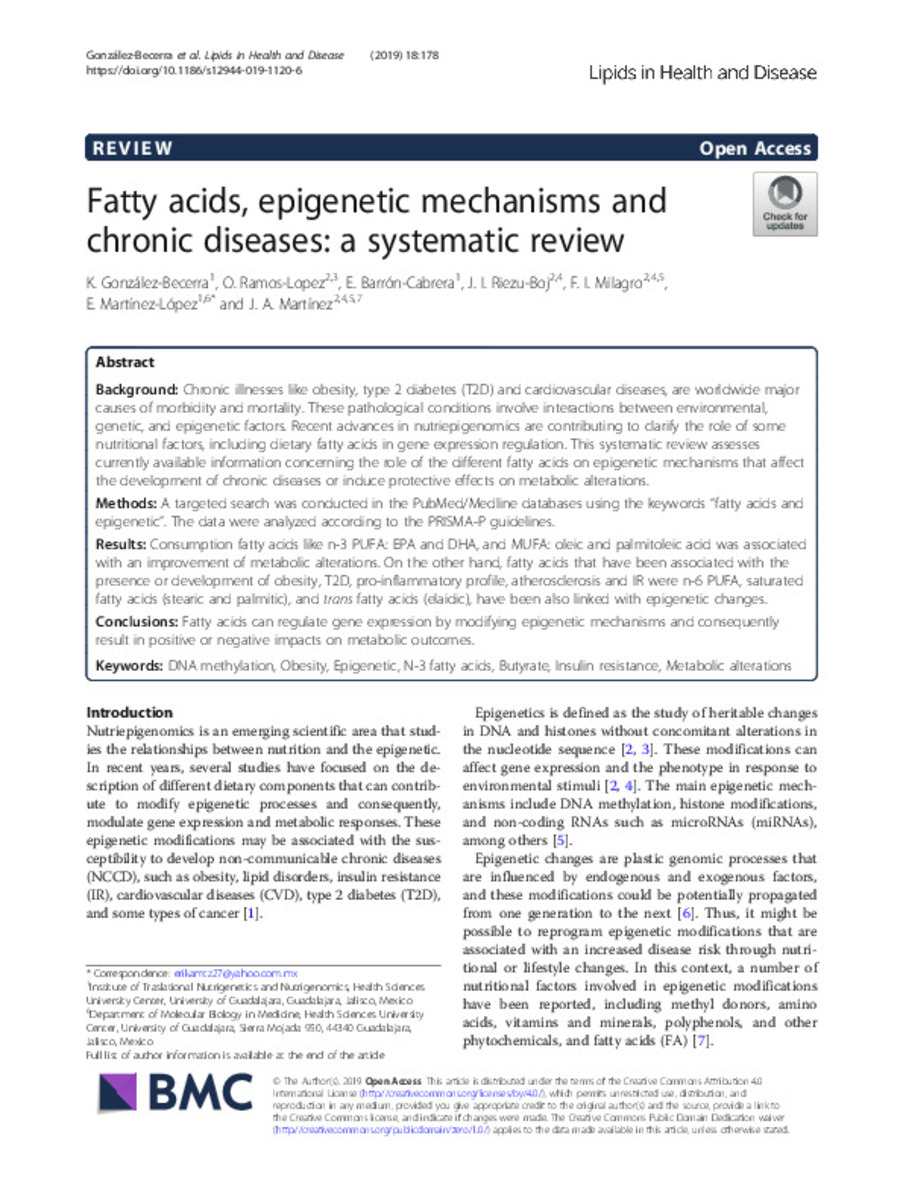Full metadata record
| DC Field | Value | Language |
|---|---|---|
| dc.creator | González-Becerra, K. (K.) | - |
| dc.creator | Ramos-López, O. (Omar) | - |
| dc.creator | Barrón-Cabrera, E. (E.) | - |
| dc.creator | Riezu-Boj, J.I. (José Ignacio) | - |
| dc.creator | Milagro-Yoldi, F.I. (Fermín Ignacio) | - |
| dc.creator | Martínez-López, E. (E.) | - |
| dc.creator | Martinez-Climent, J.A. (José Ángel) | - |
| dc.date.accessioned | 2021-11-02T09:05:35Z | - |
| dc.date.available | 2021-11-02T09:05:35Z | - |
| dc.date.issued | 2019 | - |
| dc.identifier.citation | González-Becerra, K. (K.); Ramos-López, O. (Omar); Barrón-Cabrera, E. (E.); et al. "Fatty acids, epigenetic mechanisms and chronic diseases: a systematic review". Lipids in Health and Disease. 18 (178), 2019, 5469 | es_ES |
| dc.identifier.issn | 1476-511X | - |
| dc.identifier.uri | https://hdl.handle.net/10171/62300 | - |
| dc.description.abstract | Background: Chronic illnesses like obesity, type 2 diabetes (T2D) and cardiovascular diseases, are worldwide major causes of morbidity and mortality. These pathological conditions involve interactions between environmental, genetic, and epigenetic factors. Recent advances in nutriepigenomics are contributing to clarify the role of some nutritional factors, including dietary fatty acids in gene expression regulation. This systematic review assesses currently available information concerning the role of the different fatty acids on epigenetic mechanisms that affect the development of chronic diseases or induce protective effects on metabolic alterations. Methods: A targeted search was conducted in the PubMed/Medline databases using the keywords “fatty acids and epigenetic”. The data were analyzed according to the PRISMA-P guidelines. Results: Consumption fatty acids like n-3 PUFA: EPA and DHA, and MUFA: oleic and palmitoleic acid was associated with an improvement of metabolic alterations. On the other hand, fatty acids that have been associated with the presence or development of obesity, T2D, pro-inflammatory profile, atherosclerosis and IR were n-6 PUFA, saturated fatty acids (stearic and palmitic), and trans fatty acids (elaidic), have been also linked with epigenetic changes. Conclusions: Fatty acids can regulate gene expression by modifying epigenetic mechanisms and consequently result in positive or negative impacts on metabolic outcomes. | es_ES |
| dc.language.iso | eng | es_ES |
| dc.publisher | Springer Science and Business Media LLC | es_ES |
| dc.rights | info:eu-repo/semantics/openAccess | es_ES |
| dc.subject | DNA methylation | es_ES |
| dc.subject | Obesity | es_ES |
| dc.subject | Epigenetic | es_ES |
| dc.subject | N-3 fatty acids | es_ES |
| dc.subject | Butyrate | es_ES |
| dc.subject | Insulin resistance | es_ES |
| dc.subject | Metabolic alterations | es_ES |
| dc.title | Fatty acids, epigenetic mechanisms and chronic diseases: a systematic review | es_ES |
| dc.type | info:eu-repo/semantics/article | es_ES |
| dc.description.note | Open Access This article is distributed under the terms of the Creative Commons Attribution 4.0 International License , which permits unrestricted use, distribution, and reproduction in any medium, provided you give appropriate credit to the original author(s) and the source, provide a link to the Creative Commons license, and indicate if changes were made. | es_ES |
| dc.identifier.doi | 10.1186/s12944-019-1120-6 | - |
| dadun.citation.number | 178 | es_ES |
| dadun.citation.publicationName | Lipids in Health and Disease | es_ES |
| dadun.citation.startingPage | 5469 | es_ES |
| dadun.citation.volume | 18 | es_ES |
Files in This Item:
Statistics and impact
Items in Dadun are protected by copyright, with all rights reserved, unless otherwise indicated.






